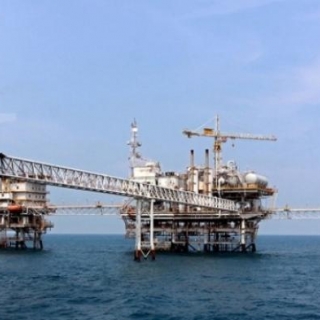


Oil prices surged about 5% to a two-week high on Thursday (October 23rd) after the US imposed sanctions on major Russian suppliers Rosneft (ROSN.MM) and Lukoil (LKOH.MM) over Moscow's war in Ukraine, prompting energy companies in China and India to consider reducing Russian imports.
Brent crude futures rose $3.40, or 5.4%, to $65.99 a barrel, while U.S. West Texas Intermediate (WTI) crude rose $3.29, or 5.6%, to $61.79. The daily percentage gains were the largest for both crude contracts since mid-June and the highest close since October 8th.
"The announcement of US sanctions against Rosneft and Lukoil represents a major escalation in targeting Russia's energy sector and could be a shock large enough to tip the global oil market into deficit next year," said David Oxley, chief climate and commodities economist at Capital Economics.
Russia was the world's second-largest crude oil producer in 2024 after the US, according to US energy data. In addition to soaring crude prices, US diesel futures jumped nearly 7%, pushing the diesel crack spread to its highest level since February 2024. The crack spread measures refining profit margins.
The US sanctions mean refiners in China and India, major buyers of Russian oil, will need to find alternative suppliers to avoid exclusion from Western banking systems, said Saxo Bank analyst Ole Hansen. Several trading sources told Reuters that China's state oil company has suspended purchases of seaborne Russian oil from the two companies now subject to US sanctions, further driving up prices.
Kuwait's oil minister said that the Organization of the Petroleum Exporting Countries (OPEC) would be ready to offset any market shortfall by easing production cuts. However, Russian President Vladimir Putin said it would take time for global markets to replace Russian oil.
"This is, of course, an attempt to pressure Russia," Putin added. "But no self-respecting country and no self-respecting people will decide anything under pressure." The US said it was ready to take further action and urged Moscow to immediately agree to a ceasefire in Ukraine.
"Various US and EU sanctions have so far had essentially no effect on Russia's ability to export oil, so we doubt that this latest round of sanctions will change the situation. Even so, the Kremlin may need to use more sophisticated methods to ship its oil covertly, thus increasing costs," said Pavel Molchanov, investment strategy analyst at Raymond James. Molchanov noted that the US investment bank will "continue to monitor this issue" as Russian exports account for about 7% of global oil supplies. (alg)
Source: Reuters
Oil prices were little changed in Asian trading on Thursday after US President Donald Trump backed down from a threat to impose tariffs on European countries over Greenland. This decision helped ease ...
Oil prices rose on Tuesday, supported by a combination of supply disruptions from Kazakhstan, improved global economic growth projections, and a weakening US dollar, making dollar-denominated oil chea...
Oil traded in a tight range on Thursday after two straight sessions of losses, as markets digested a sharper US push to shape Venezuela's crude flows—alongside fresh tanker seizures tied to sanctions....
Oil prices edged higher as the market digested the United States' latest moves regarding Venezuela. WTI held steady at US$56/barrel after a sharp drop, while Brent remained below US$60/barrel. This s...
Brent crude prices sank in volatile trading on Wednesday after U.S. President Donald Trump said Venezuela will supply tens of millions of barrels of oil to Washington. Oil prices were nursing losses ...
Gold prices briefly caused a stir after hitting a new record, but then slowed. The main trigger: US President Donald Trump withheld the threat of tariffs on Europe and claimed there was a "framework" for a future agreement on Greenland. This calmer...
Oil prices were little changed in Asian trading on Thursday after US President Donald Trump backed down from a threat to impose tariffs on European countries over Greenland. This decision helped ease geopolitical tensions and improve market...
The Nikkei 225 Index climbed 1.73% to close at 53,689, while the broader Topix Index rose 0.74% to 3,616 on Thursday, snapping a five-day losing streak as Japanese shares were lifted by a strong rally in chip and artificial intelligence related...